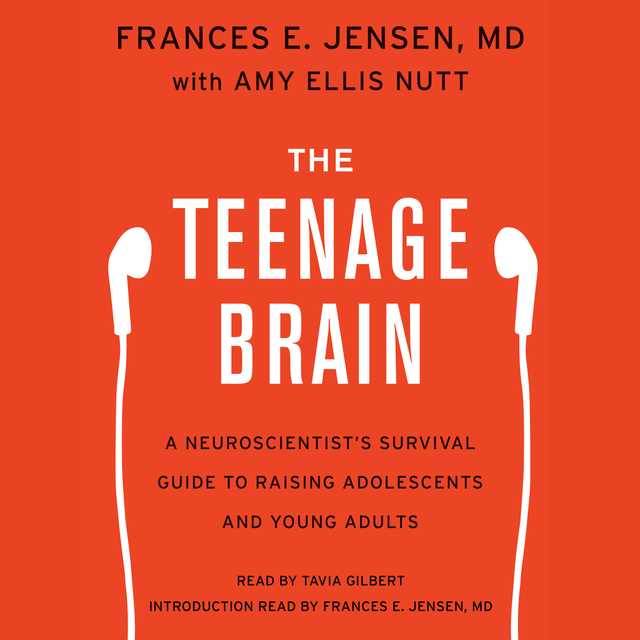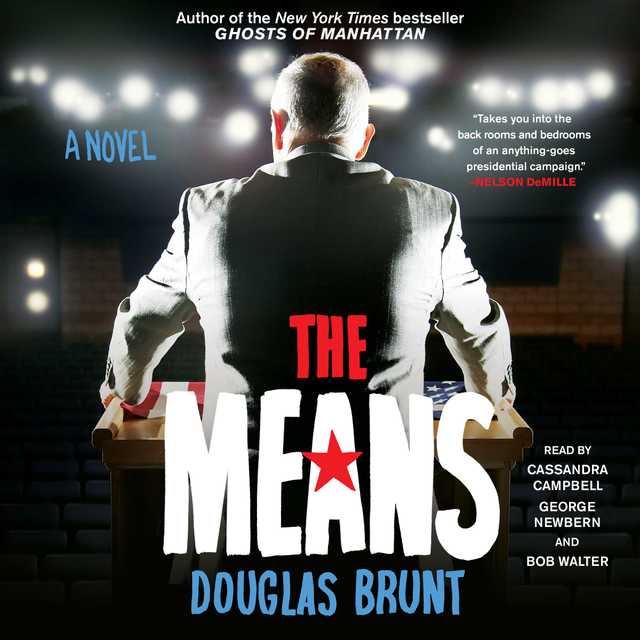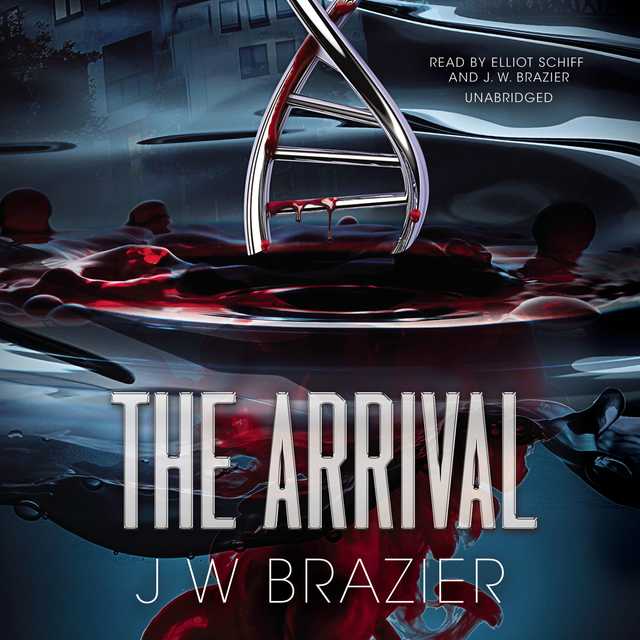The Teenage Brain Audiobook Summary
A New York Times Bestseller
Renowned neurologist Dr. Frances E. Jensen offers a revolutionary look at the brains of teenagers, dispelling myths and offering practical advice for teens, parents and teachers.
Dr. Frances E. Jensen is chair of the department of neurology in the Perelman School of Medicine at the University of Pennsylvania. As a mother, teacher, researcher, clinician, and frequent lecturer to parents and teens, she is in a unique position to explain to readers the workings of the teen brain. In The Teenage Brain, Dr. Jensen brings to readers the astonishing findings that previously remained buried in academic journals.
The root myth scientists believed for years was that the adolescent brain was essentially an adult one, only with fewer miles on it. Over the last decade, however, the scientific community has learned that the teen years encompass vitally important stages of brain development. Samples of some of the most recent findings include:
- Teens are better learners than adults because their brain cells more readily “build” memories. But this heightened adaptability can be hijacked by addiction, and the adolescent brain can become addicted more strongly and for a longer duration than the adult brain.
- Studies show that girls’ brains are a full two years more mature than boys’ brains in the mid-teens, possibly explaining differences seen in the classroom and in social behavior.
- Adolescents may not be as resilient to the effects of drugs as we thought. Recent experimental and human studies show that the occasional use of marijuana, for instance, can cause lingering memory problems even days after smoking, and that long-term use of pot impacts later adulthood IQ.
- Multi-tasking causes divided attention and has been shown to reduce learning ability in the teenage brain. Multi-tasking also has some addictive qualities, which may result in habitual short attention in teenagers.
- Emotionally stressful situations may impact the adolescent more than it would affect the adult: stress can have permanent effects on mental health and can to lead to higher risk of developing neuropsychiatric disorders such as depression.
Dr. Jensen gathers what we’ve discovered about adolescent brain function, wiring, and capacity and explains the science in the contexts of everyday learning and multitasking, stress and memory, sleep, addiction, and decision-making. In this groundbreaking yet accessible book, these findings also yield practical suggestions that will help adults and teenagers negotiate the mysterious world of adolescent development.
Other Top Audiobooks
The Teenage Brain Audiobook Narrator
Tavia Gilbert is the narrator of The Teenage Brain audiobook that was written by Frances E. Jensen
Frances E. Jensen, MD, is Professor and Chair of the Department of Neurology at the Perelman School of Medicine, University of Pennsylvania. She was Professor of Neurology at Harvard Medical School, Director of Translational Neuroscience and Director of Epilepsy Research at Boston Children’s Hospital, and Senior Neurologist at Boston Children’s and Brigham and Women’s Hospitals. She lectures widely about the teen brain at science museums, TEDMED, and high schools.
About the Author(s) of The Teenage Brain
Frances E. Jensen is the author of The Teenage Brain
More From the Same
- Publisher : HarperAudio
- Abraham
- American Gods [TV Tie-In]
- Dead Ringer
- House of Sand and Fog
- Prey
The Teenage Brain Full Details
| Narrator | Tavia Gilbert |
| Length | 9 hours 1 minutes |
| Author | Frances E. Jensen |
| Publisher | HarperAudio |
| Release date | February 03, 2015 |
| ISBN | 9780062414861 |
Additional info
The publisher of the The Teenage Brain is HarperAudio. The imprint is HarperAudio. It is supplied by HarperAudio. The ISBN-13 is 9780062414861.
Global Availability
This book is only available in the United States.
Goodreads Reviews
Yousif
November 20, 2019
Eye-opening book on the teenage brain, and human brains generally. It will downright change the way we view teenagers and kids. An absolute 'paradigm-shifter’.Frances, a neurologist herself, showcases the scientific evidence on how teenage brains are substantially different than adult brains in many ways. Putting time to understand the differences will place both adults and teenagers in a better position to acknowledge and reconcile the differences and how things are viewed by both of them.Sleep, taking risks, tobacco, alcohol, pot, drugs, stress, mental illness, digital invasion, gender matters, sports and concussions, crime and punishment (very interesting section for lawyers) and more are dissected in this book, giving a more comprehensive view of the relationship and effect of such things on the teenage brains compared to adults.Highly recommended, though there will often be some neurological terminologies throughout the book that might put some people off especially the ones who can't withstand reading (or listening) to the lovely brainy words like frontal lobes, neocortex, grey matter, white matter, thalamus, hippocampus, basal ganglia, amygdala, limbic system and other stuff of the brain.
Tracy
June 26, 2016
A friend recommended this book and I'm so glad that she did. Yes, I knew that teenagers' brains developed slower than parents would like, but I didn't know how exactly and which parts developed first. After reading this book, I have a much better understanding of the development of the teenaged brain.I liked the fact that she covered what is involved as a child becomes a teenager not only with the brain, but a bit about the hormonal changes, too. She then goes on to discuss learning; sleep; risk taking; drugs, alcohol and smoking; stress; mental illness; digital "invasions"; gender; and concussions. Each section was written so that the average parent could understand the importance of that section and gave ammunition to use in discussing why that particular section was important. I found the section on sleep to be really interesting and also the section on gender. The concussion section was one that I wish I wasn't familiar with, but was glad that she addressed it.If you have teenagers or will have teenagers soon, you really should read this book.
Johnathan
October 12, 2019
Excellently written outline of how the teenage brain is not fully developed, has a higher propensity for addiction and risk taking, and has very high plasticity. When you combine these elements it leads to many complications for both adolescents and the parents that raise and guide them. Jensen carefully outlines how these factors present both opportunities and challenges related to decision making, drugs, alcohol, tobacco, technology, risky behavior, sexuality, mental illness, and crime. Jensen presents advice drawn from her scientific background as a neuroscientist as well as her experience as a parent. I recommend this book for every parent, teacher, youth worker, and anyone else that works regularly with youth. The perspective this book gives us extremely valuable.
Marwa
May 25, 2017
It's very scientific, but it's an eye opener .. it's useful specially with this generation teenagers who like to have the answers for "whys" when you want to convince them why they should or shouldn't do the thing. Highly recommended ❤️
Jessica
March 09, 2015
Parents and teachers: read this book and say it with me, "It's not personal; it's just adolescence!"
Kiwiflora
March 25, 2015
Review copy provided by Harper Collins Publishers NZ via Booksellers NZ.The teenage brain? What sort of word trickery is that? Well, all logic tells you there is a brain of course, nestling inside the head of that child of yours, but it is not a brain, Jim, as we know it. And that is the totally bizarre thing about teenagers - after all we were all one once angst ridden, tormented, self absorbed, idealistic, misunderstood, unloved - so you think we would have no problem some years down the track dealing with our own teenager's tormented souls. And that is the conumdrum of it all. Our brains, unbeknown to us, moved on from being teenage brains somewhere in our 20s (hopefully), maybe by our 30s (more likely). But now that our wiring is different, we have no understanding really on what is going on in our darlings' brains. This book attempts to redress this lack of knowledge and understanding to us - parents, teachers, other significant grown ups. Frances Jensen is a professor of neurology at the University of Pennsylvania. Blessedly, she is also the parent of two fine sounding young men who were once teenagers. It would seem, from her biography blurb at the back of this book, that she is a specialist in the developing brain and age specific therapies. So, not so much a handbook on how to deal with your teenager(s), more a handbook on what is going on inside their heads and so lead to some understanding. So this may seem like a medical book and not for the average teen parent, but it is extremely readable, probably because it was co-authored with a Pulitzer Prize winning science writer who writes for the Washington Post and so well used to turning medical language/concepts/theories etc into everday language for us mere mortals. There is plenty of brain terminology in this book - amygdala, frontal cortex, cortical map, hippocampus, hypothalamus, myelin, how they all work, how they change and interact with each other during the teen years to produce a different type of brain at the end of it all. And most importantly how all these changes lead to and directly cause the behaviours that we see so frequently in our teens - their flawed decision making, impulsiveness, inability to be rational, sensible, that boys' brains are different from girls' brains, why their body clock is out of whack. As I have said, Ms Jensen is a scientist, not a psychologist, so not much in this book on how to deal with teenagers. But I found myself regularly referring to NZ psychologist and author Nigel Latta's writings on parenting teenagers, with his Mad Uncle Jacks and Mad Aunt Janes, which gives plenty of advice on dealing with all this weird and alarming brain change. So I think the two complement each other very nicely.There were some sections of medical terminology and explanation when I felt my eyes glazing over, but throughout the book the authors are constantly referencing the biology with the evidence, that is what we see, and so it does all gradually come together, and I do know a lot more about the functioning of the brain than previously. A lot of issues are covered in this book that affect teenagers differently from children and adults. How the brain learns, sleep patterns, risk taking, the effects of alcohol and cannabis, mental illness and the digital invasion. The two chapters that I found the most alarming and that I think all parents should have an understanding of are stress and its impact on teenage wellbeing, and the danger of sports and concussions. This book is written by an American and published in America, but many of the issues in high schools and colleges there are also in New Zealand schools. With an 18 year old and a 20 year old, our time in the dark, never ending teenage tunnel is thankfully nearing an end, and the light is getting brighter and closer. But there is an increasing obsession in our schools to be the best in sport and/or academics to the detriment of the students supposedly earning that glory. As these two chapters reveal, the impact of this endless race to the top can take a serious toll on our young ones, physically, mentally and emotionally. As parents, the ones closest to our teens, we really do need to be mindful of how things can go wrong inside their heads that may take some time to actually show up. There is a lot of very good stuff in this book, reading it will certainly increase your arsenal of information about teenagers, and hopefully your understanding and communication with them.
Jami
February 29, 2016
The Teenage Brain by Frances Jensen grabbed my attention right away. Who doesn’t want to gain wisdom about the most baffling time of life? As a high school teacher, it’s important for me to understand my students in order to best connect with and teach them. This book helped me recognize how to do this on a different level. Since the author is both a neurologist and the mother of two boys who have been through the teenage years, she offers both insight as well as practical advice on how to handle and help teenagers through this growth period of their lives.While not specifically about teaching, this book explicitly discusses how the brain of a teenager differs from that of both a child and an adult, but it does so in an engaging manner, which kept me reading. This is quite an interesting phase of life, and understanding these differences provides the opportunity to have a bit more compassion for teens and the sometimes questionable decisions they make as well as teaches how to help them avoid potentially dangerous situations despite the still growing maturity of their brains. In fact, the book largely dealt with how to help teens avoid problems and situations that could even be deadly. Aimed at parents, this book is also a helpful read for teachers or truly anyone who interacts with teens on a regular basis. It’s a good reminder that these people aren’t children, but they’re really not yet adults, either, so we must find a way to connect with them on their playing field.
Lauri
February 10, 2018
While most of us understand the basics of puberty and the hormones that kick it into gear, this book delves into the biological details of this time of life. By presenting those particulars of brain chemistry and development, Jensen gives readers a better understanding of WHY teens and young adults behave the way they do. We spend so much time learning about infant and toddler development in order to help our children be the best they can be, we neglect this second highly impressionable developmental stage. Because of this lack of understanding, we often expect the wrong things of our kids, jeopardizing the trust they have in us to help them grow into the adults we'd always hoped they would become. In order to help my teens navigate adolescence, these facts are helping me to evaluate my previous missteps in order to make choices that will more appropriately help us reach our goals.
Amy
January 30, 2019
This was a scientific look at why teenagers behave the way they do. Their brains are not fully myelinated and won't be until their early 20's. They don't have all the synapses connected and functioning in their frontal lobe. It was a good scientific explanation about why teenagers behave the way they do. There were some interesting studies and stories mentioned and I have a few good take aways about their abilities to forecast consequences and lack of organizational skills.
Frequently asked questions
Listening to audiobooks not only easy, it is also very convenient. You can listen to audiobooks on almost every device. From your laptop to your smart phone or even a smart speaker like Apple HomePod or even Alexa. Here’s how you can get started listening to audiobooks.
- 1. Download your favorite audiobook app such as Speechify.
- 2. Sign up for an account.
- 3. Browse the library for the best audiobooks and select the first one for free
- 4. Download the audiobook file to your device
- 5. Open the Speechify audiobook app and select the audiobook you want to listen to.
- 6. Adjust the playback speed and other settings to your preference.
- 7. Press play and enjoy!
While you can listen to the bestsellers on almost any device, and preferences may vary, generally smart phones are offer the most convenience factor. You could be working out, grocery shopping, or even watching your dog in the dog park on a Saturday morning.
However, most audiobook apps work across multiple devices so you can pick up that riveting new Stephen King book you started at the dog park, back on your laptop when you get back home.
Speechify is one of the best apps for audiobooks. The pricing structure is the most competitive in the market and the app is easy to use. It features the best sellers and award winning authors. Listen to your favorite books or discover new ones and listen to real voice actors read to you. Getting started is easy, the first book is free.
Research showcasing the brain health benefits of reading on a regular basis is wide-ranging and undeniable. However, research comparing the benefits of reading vs listening is much more sparse. According to professor of psychology and author Dr. Kristen Willeumier, though, there is good reason to believe that the reading experience provided by audiobooks offers many of the same brain benefits as reading a physical book.
Audiobooks are recordings of books that are read aloud by a professional voice actor. The recordings are typically available for purchase and download in digital formats such as MP3, WMA, or AAC. They can also be streamed from online services like Speechify, Audible, AppleBooks, or Spotify.
You simply download the app onto your smart phone, create your account, and in Speechify, you can choose your first book, from our vast library of best-sellers and classics, to read for free.
Audiobooks, like real books can add up over time. Here’s where you can listen to audiobooks for free. Speechify let’s you read your first best seller for free. Apart from that, we have a vast selection of free audiobooks that you can enjoy. Get the same rich experience no matter if the book was free or not.
It depends. Yes, there are free audiobooks and paid audiobooks. Speechify offers a blend of both!
It varies. The easiest way depends on a few things. The app and service you use, which device, and platform. Speechify is the easiest way to listen to audiobooks. Downloading the app is quick. It is not a large app and does not eat up space on your iPhone or Android device.
Listening to audiobooks on your smart phone, with Speechify, is the easiest way to listen to audiobooks.






























